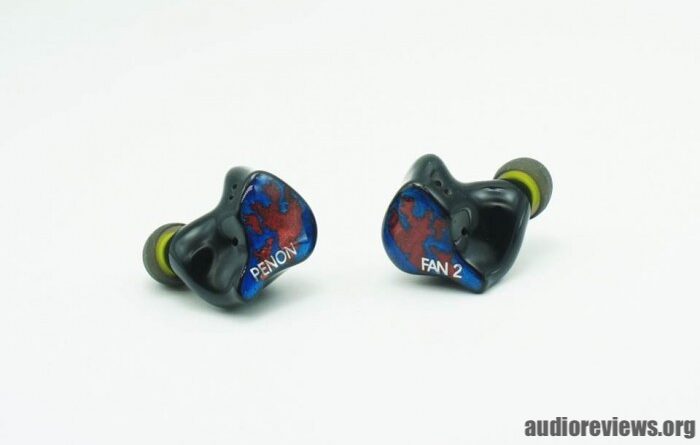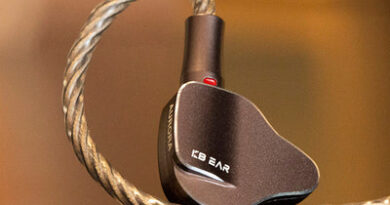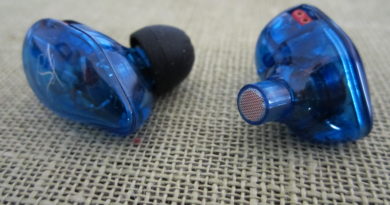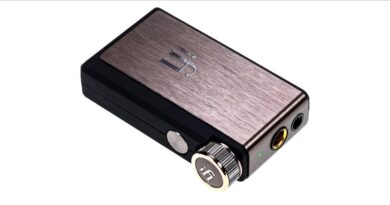Penon Fan 2 Review – Nearly There
Penon is for whatever reason outside my normal “orbits” when it comes to assessing novelties. There’s no negative reason why, I guess, except maybe for the simple fact that I tend to have an apriori higher interest on japanese, american or european products.
Be as it may, I did assess a Penon driver (the Sphere) some time ago and I found it so wonderful it got stuck to our Wall of Excellence as the best single BA money can buy below $250, and that probably still is the case.
So it’s with quite some curiosity that I borrowed this pair of privately owned Fan 2 for a few days. They can be purchased on Penon’s site, here, for $279 plus freight and EU duties if applicable of course.
In this Article
At-a-glance Card
| PROs | CONs |
| Very nice organic tonality. | (Modest) timbre incoherence. |
| Very good note body compromise. | Somewhat wooly bass timbre. |
| Commendable bass and treble. | Layering might be better. |
| Good mids. | Highly fit / tip dependent. |
| Very good imaging and separation. | May be uncomfortable. |
Full Device Card
Test setup and preliminary notes
Sources: Sony NW-A55 mrWalkman / Questyle QP1R, QP2R, M15, CMA-400i – TRN T ear tips – Dunu DUW-02S cable – lossless 16-24/44.1-192 FLAC and DSD64/128/256 tracks.
I am not writing these articles to help manufacturers promote their products, even less I’m expecting or even accepting compensation when I do. I’m writing exclusively to share my fun – and sometimes my disappointment – about gear that I happen to buy, borrow or somehow receive for audition.
Another crucial fact to note is that I have very sided and circumscribed musical tastes: I almost exclusively listen to jazz, and even more particularly to the strains of post bop, modal, hard bop and avantgarde which developed from the late ’50ies to the late ’70ies. In audio-related terms this implies that I mostly listen to musical situations featuring small or even very small groups playing acoustic instruments, on not big stages.
One of the first direct consequences of the above is that you should not expect me to provide broad information about how a certain product fairs with many different musical genres. Oppositely, you should always keep in mind that – different gear treating digital and analog sound in different ways – my evaluations may not, in full or in part, be applicable to your preferred music genre.
Another consequece is that I build my digital library by painstakingly cherrypick editions offering the least possible compression and pumped loudness, and the most extended dynamic range. This alone, by the way, makes common music streaming services pretty much useless for me, as they offer almost exclusively the polar opposite. And again by the way, quite a few of the editions in my library are monoaural.
Additionally: my library includes a significant number of unedited, very high sample rate redigitisations of vinyl or openreel tape editions, either dating back to the original day or more recently reissued under specialised labels e.g. Blue Note Tone Poet, Music Matters, Esoteric Jp, Analogue Productions, Impulse! Originals, and such. Oppositely, I could ever find and extremely small number of audible (for my preferences) SACD editions.
My source gear is correspondigly selected to grant very extended bandwidth, high reconstruction proweness, uncolored amping.
And finally, my preferred drivers (ear or headphones) are first and foremost supposed to feature solid note-body timbre, and an as magically centered compromise between fine detail, articulated texturing and microdynamics as their designers can possibly achieve.
In terms of presentation, for IEMs I prefer one in the shape of a DF curve, with some very moderate extra pushup in the midbass. Extra sub-bass enhancement is totally optional, and solely welcome if seriously well controlled. Last octave treble is also welcome from whomever is really able to turn that into further spatial drawing upgrade, all others please abstain.
Signature analysis
Tonality
Fan 2 have a mid-bodied note weight, showing some modest timbre incoherence between bass and treble segments (latter beind of course tighter and dryer). The tonality is however very natural across the board, with a modest, inoffensive tint of warmth, in a somewhat U-shaped, pleasant presentation
Sub-Bass
Rumble is very nicely calibrated, not too impositive nor too shy.
Mid Bass
Fan 2 deliver a very good mid bass line as notes are bodied, quite textured and almost punchy. It’s a good compromise between overly punchy / arid on one extreme and bleeding / boomy on the opposite. Timbre is a whiff wooly here, which is at the base of the abovementioned modest horizontal incoherence.
Mids
Mids are not forward but their timbre is natural and not lean, notes are decently bodied. Highmids are well present, quite energetic and well rounded, never offensive and almost glare free.
Male Vocals
Male singers come across well textured and organic on Fan 2, although not particularly outstanding vs the rest and a bit too lean to sound really organic. They may occasionally be influenced by (without outright succumbing to, though) the midbass warmth.
Female Vocals
Fan 2 offer a good rendering of female vocals, not particularly outstanding but not offensive let alone sibilant, while – like males – still a bit too lean to sound truly organic. Not a bad job for a non-vocal-specific driver though.
Highs
Treble is another part where Fan 2 strike a very good balance. They are vivid, open, almost airy, almost sparkly, without ever getting into excess leanness let alone scanting into metallic or artificial sheen. Sole negative notes are the already mentioned (modest) timbre incoherence vs the midbass and some very occasional splashyness.
Technicalities
Soundstage
Stage projection will depend quite a bit on fit optimization (see below). In best situation it’s not very wide, decently high and remarkably deep.
Imaging
Macrodynamics are no doubt amongst Fan 2 fortes: instruments are very pleasantly and distinctly positioned on the stage, and there’s air, clean space between them.
Details
Fan 2’s detail retrieval is simply “good”, thanks to the good work of the BA up there, free from excesses, and the good control imposed on the 2 dynamic drivers in the bass.
Instrument separation
Separation between main voices is very good thanks to very good imaging. Layering is also good, however it sometimes falls short, especially from the mids down, which is connected to the previously mentioned sligtly “wooly” timbre I found.
Driveability
Fan 2’s dynamic drivers are very sensitive to source impedance: a very low impedance host is recommended to avoid getting an evident bump in the mid bass. Apart for that, their quite high sensitivity help making it easy to get them amped mode than decently also by budget sources typically incapable of goo current flows below 16 ohm.
Physicals
Build
Housings are made of medical-grade resin and they seem quite solid but their most apparent feature is aesthetical beauty which is indeed a welcome if sadly uncommon case. The shape is clearly intended to offer as much hergonomicity to as many users as possible. Nozzles are uncommonly long, which is a love/hate thing I guess.
Fit
Fan 2 enter the class of very fit-sensitive drivers: move in-out, or even change their insertion angle and you’ll get quite obvious tonality and technicalities differences. In my case (see below) their particular shape & size is a further hurdle to find the ideal positioning + comfort + sound quality compromise.
After some long rolling I found TRN T EAR tips contribute to shorten midbass transients that little bit that makes them more neatly punchy without losing texture on one end, while – thanks to their short stems – helping on compensating long nozzles.
Comfort
I’m not particularly fond of Fan 2’s particular shape & size: in spite of the long nozzle the housings stay somewhat too “outside” my concha transferring me an unpleasant sensation of instability.
Isolation
Passive isolation is going to be quite good for all those who are lucky enough to have Fan 2 housings “seal” into their conchas.
Cable
I couldn’t assess Penon stock cable. Dunu DUW-02S pairs wonderfully though.
Specifications (declared)
| Housing | 3D printing resin, medical grade resin cavity |
| Driver(s) | 2 x 6mm dynamic driver for low frequency, 1 x Sonion BA for middle frequency, 1 x Knowles BA for high frequency |
| Connector | 2-pin 0.78mm |
| Cable | Penon OS133 cable: 2 shares, single share is 133 cores, a total of 266 cores |
| Sensitivity | 112 dB/mW |
| Impedance | 13 Ω |
| Frequency Range | 20-20000Hz |
| Package & accessories | n/a (assessed privately owned sample) |
| MSRP at this post time | $279 |
Considerations & conclusions
Fan 2 are good, and I mean seriously good. They really have all it takes, and they do put it to good use to deliver a very pleasant musical experience. They are energetic however not violent, detailed however not aseptic, and feature a spot-on note body compromise, all of which make a superb allrounder of them. They also draw a sizeable scene, and cast wonderful imaging.
The fact that in spite of all that precedes I did not fall in love should honestly be considered totally incidental. My preference case is quite sided (see description above) and Fan 2’s somewhat too “soft” (slightly “wooly” I called it) note timbre is probably a much more a turn off for me than for many others.
I also do value layering quite highly, and that’s an aspect where Fan 2 don’t excel (without however being “bad”, mind you…). So for me Fan 2 is just “nearly there”, but as I said YMMV (for the better).
At their $279 price Fan 2 is no doubt to be taken in high consideration. It’s definitely relieving to find a piece of “chifi” manufacturing which is seriously worth its price. Good job Penon.
Our generic standard disclaimer.








Subscribing to PenonAudioStore newsletter can bring you a 50% off coupon for FAN 2.
Just saying 🙂